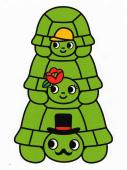1.Are feelings, emotions and facial expressions universal across borders, happy, sad, etc..?
I think that are same.
The Japanese proverb has " facial expressions speak".
2. Try to name as many feelings as possible in Japanese. ( 10 minimum) Then, write the English translation.
①うれしい(happy)
②楽しい(hpppy)
③悲しい(sad)
④めんどくさい(troublesome)
⑤退屈(borling)
⑥刺激的(exciting)
⑦興味のある(interesting)
⑧苦しい(hard)
⑨腹立つ(annoy)
⑩好き(like)
⑪嫌い(dislike)
3. Are there any feelings in Japanese that cannot be translated into English?
Yes. Japanese people often use onomatopoeia.
For example, When someone work a road, Japanse people conceive many sounds.
2009年6月7日日曜日
homework may 24
1. How do you greet members of your family? (mother, father, older brother, younger brother, grandparents, etc.)
When I greet my friends, I try to keep a smile.
When I greet my family, whereas I am unsociable.
My fanily accept my feeling, so somethime I am blunt.
2. How do you greet people that are important in society?
I think it is very important to polite bow.
Alomost Japanese people think that how to bow is very important.
3. Do you greet people from the opposite sex in a different way?
No I don't.
4. Do you hug anyone? If yes, who and when. If no, why not?
No I don't, because to hug someone is too familiar.
When I greet my friends, I try to keep a smile.
When I greet my family, whereas I am unsociable.
My fanily accept my feeling, so somethime I am blunt.
2. How do you greet people that are important in society?
I think it is very important to polite bow.
Alomost Japanese people think that how to bow is very important.
3. Do you greet people from the opposite sex in a different way?
No I don't.
4. Do you hug anyone? If yes, who and when. If no, why not?
No I don't, because to hug someone is too familiar.
登録:
コメント (Atom)
